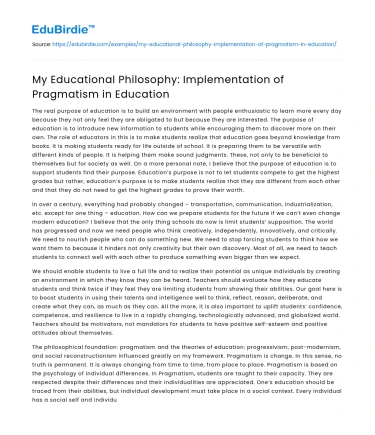The real purpose of education is to build an environment with people enthusiastic to learn more every day because they not only feel they are obligated to but because they are interested. The purpose of education is to introduce new information to students while encouraging them to discover more on their own. The role of educators in this is to make students realize that education goes beyond knowledge from books. It is making students ready for life outside of school. It is preparing them to be versatile with different kinds of people. It is helping them make sound judgments. These, not only to be beneficial to themselves but for society as well. On a more personal note, I believe that the purpose of education is to support students find their purpose. Education’s purpose is not to let students compete to get the highest grades but rather, education’s purpose is to make students realize that they are different from each other and that they do not need to get the highest grades to prove their worth.
In over a century, everything had probably changed – transportation, communication, industrialization, etc. except for one thing – education. How can we prepare students for the future if we can’t even change modern education? I believe that the only thing schools do now is limit students’ supposition. The world has progressed and now we need people who think creatively, independently, innovatively, and critically. We need to nourish people who can do something new. We need to stop forcing students to think how we want them to because it hinders not only creativity but their own discovery. Most of all, we need to teach students to connect well with each other to produce something even bigger than we expect.
Save your time!
We can take care of your essay
- Proper editing and formatting
- Free revision, title page, and bibliography
- Flexible prices and money-back guarantee
We should enable students to live a full life and to realize their potential as unique individuals by creating an environment in which they know they can be heard. Teachers should evaluate how they educate students and think twice if they feel they are limiting students from showing their abilities. Our goal here is to boost students in using their talents and intelligence well to think, reflect, reason, deliberate, and create what they can, as much as they can. All the more, it is also important to uplift students’ confidence, competence, and resilience to live in a rapidly changing, technologically advanced, and globalized world. Teachers should be motivators, not mandators for students to have positive self-esteem and positive attitudes about themselves.
The philosophical foundation: pragmatism and the theories of education: progressivism, post-modernism, and social reconstructionism influenced greatly on my framework. Pragmatism is change. In this sense, no truth is permanent. It is always changing from time to time, from place to place. Pragmatism is based on the psychology of individual differences. In Pragmatism, students are taught to their capacity. They are respected despite their differences and their individualities are appreciated. One’s education should be traced from their abilities, but individual development must take place in a social context. Every individual has a social self and individuality can best be developed in and through society. This is what I believe education should be about. I think students have been stereotyped that if they do not follow the rules or get low grades, they will end up as disastrous individuals someday; but I completely detest to that. We are unique individuals and the I think one thing that leads these students to delinquency is they feel they do not have the right to be heard or that they couldn’t do anything right. But could you imagine a world where everyone is valued? I think if we practice Pragmatism more and more to education today, we can encourage students to chase knowledge and enrich their abilities. Education as they said is the preparation for life. So why do we determine what students must learn? In my opinion, they should be determining their goals according to their needs and interests own their own and not being dictated to them. Therefore, we should not expect the same output from students in a class who incline in Math and Science with students who incline in Music and Arts as that would be a great disregard to Pragmatism. More to that, I believe that students should grow with change as there is no certain reality as change is the only constant thing in this world. Students should evolve along these changes. As I said earlier, it seems to me that schools nowadays are not preparing the students for the future but the past. Yes, we could learn from history, but we cannot be stuck in history forever. A lot has changed and so should we, even how we acquire information that’s why Pragmatism should be implemented in schools around the world. Progressivism on the other hand, says that students learn through their own experiences. Progressivism revolves around the student's needs, including teaching students to be good citizens as well as good learners, a concept known as focusing on the whole child. Progressivism, in my opinion, is one way for us to solve the differences we have right now which is miscommunication between generations. How? I believe that older generations still cannot accept the fact that there has already been a great change since their time and that education has remained the same because of this. If we push through with Progressivism, we will hear what children has to say, compromise between generations and learn more from each other. With all of these foundations and theories, I believe that we can solve the problems we face today and encourage more enthusiastic learners of tomorrow.






 Stuck on your essay?
Stuck on your essay?

